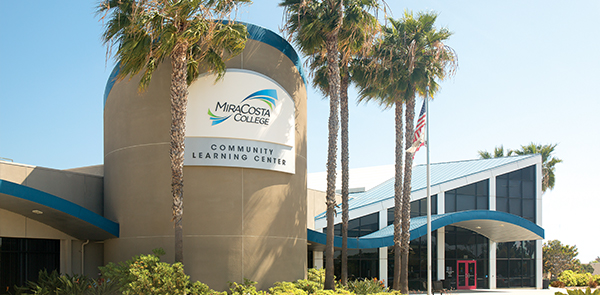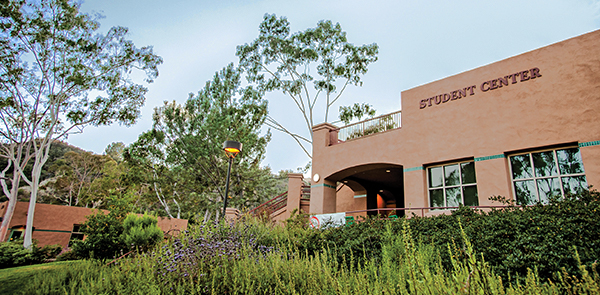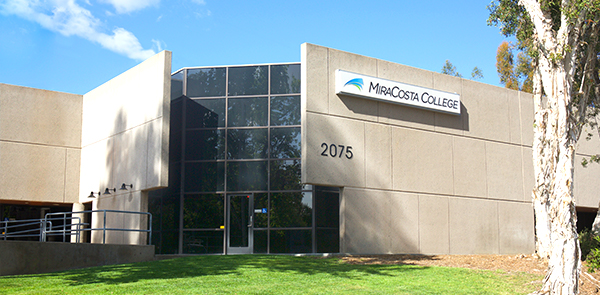 Search
MiraCosta
Search
MiraCosta
Political Science
Political Science
Associate Degrees
Associate in Arts Degree
Law, Public Policy, and Society for Transfer
Students completing this associate degree will have completed lower-division major preparation requirements for an American Studies degree, an emphasis or option within an American Studies degree, or a degree considered similar, such as Public Administration, at a participating California State University (CSU) campus.
Following transfer to a participating CSU campus, students will be required to complete no more than 60 units to obtain a bachelor's degree; however, some CSU campuses accepting this degree may require additional lower-division major preparation. This degree may not be appropriate preparation for students transferring to a CSU campus not accepting this degree or to a university or college that is not part of the CSU system. Students should consult with a MiraCosta counselor for further information regarding the most efficient pathway to transfer as an American Studies or Public Administration major and to determine which CSU campuses are participating in this program.
Graduation Requirements
- Complete a minimum of 60 CSU-transferable semester units.
- Complete all courses in the major with a “C” or "P" or better.
- Complete the Cal-GETC general education pattern.
- Obtain a minimum CSU-transferable grade point average of 2.0.
- Complete a minimum of 12 semester units in residence at MiraCosta College.
Program Student Learning Outcomes
Upon successful completion of this program, students will be able to do the following:
- Transfer to a California State University baccalaureate program in American studies, public administration, or a related major.
Course Requirements
| Required Core (26 units): | ||
| Understanding the Law (choose one course; 3 units) | 3 | |
| Introduction to the Administration of Justice * | ||
| Concepts of Criminal Law * | ||
| Legal Environment of Business | ||
| Ethics (one course; 3 units) | 3 | |
| Ethical Problems * | ||
| Oral Communication (choose one course; 3 units) | 3 | |
| Introduction to Public Speaking * | ||
| Group Communication | ||
| Written Communication (one course; 4 units) | 4 | |
| Academic Reading and Writing * | ||
| Critical Thinking (choose one course; 3-4 units) | 3-4 | |
| Argumentation | ||
| Critical Thinking and Writing * | ||
| Critical Thinking and Writing (Honors) * | ||
| Introduction to Logic | ||
| Quantitative Reasoning (choose one course; 3-5 units) | 3-5 | |
| Biostatistics * | ||
| Business Statistics * | ||
| Statistics for Behavioral Science * | ||
| Statistics for Behavioral Science (Honors) * | ||
| Introduction to Statistics in Sociology * | ||
| Introduction to Statistics * | ||
| Introduction to Statistics (Embedded Support) * | ||
| Introduction to Statistics (Honors) | ||
| U.S. History (choose one course; 3 units) | 3 | |
| United States History to 1877 * | ||
| United States History to 1877 (Honors) * | ||
| United States History Since 1877 * | ||
| United States History Since 1877 (Honors) * | ||
| American Government and Politics (one course; 4 units) | 4 | |
| American Government and Politics * | ||
| List A: Select two courses from two of the areas listed below (6 units). | 6 | |
| Courses must not have been used above. | ||
| Area 1: Administration of Justice/Criminal Justice/Criminology | ||
| Crime and Delinquency | ||
| Area 2: Business | ||
| Legal Environment of Business | ||
| Area 3: Economics | ||
| Principles of Economics: MACRO * | ||
| Principles of Economics: MICRO * | ||
| Area 4: Political Science | ||
| Introduction to Political Science * | ||
or POLS 101H | Introduction to Political Science (Honors) | |
| Comparative Government * | ||
| Introduction to International Relations * | ||
| Area 5: Public Policy | ||
| Contemporary Social Problems * | ||
| Area 6: Diversity | ||
| Cultural Anthropology * | ||
| Intercultural Communication * | ||
| People, Place, and Time: Introduction to Human Geography * | ||
| Introduction to Gender Studies * | ||
| Race and Ethnic Relations * | ||
or SOC 207 | Race and Ethnic Relations | |
| Area 7: College Success | ||
| College and Career Success | ||
| Total Units | 32-35 | |
- *
Course satisfies a general education requirement on the Cal-GETC general education (GE) pattern. To ensure this degree is completed with no more than 60 units, students should select courses that will also satisfy a GE requirement.
Associate in Arts Degree
Political Science for Transfer
Students completing this associate degree will have completed lower-division major preparation requirements for a political science degree or a degree considered similar to political science at a participating California State University (CSU) campus.
Following transfer to a participating CSU campus, students will be required to complete no more than 60 units to obtain a bachelor’s degree; however, some CSU campuses may require additional lower-division major preparation. This degree may not be appropriate preparation for students transferring to a CSU campus not accepting this degree or to a university or college that is not part of the CSU system. Students should consult with a MiraCosta counselor for further information regarding the most efficient pathway to transfer as a political science major and to determine which CSU campuses are participating in this program.
Graduation Requirements
- Complete a minimum of 60 CSU-transferable semester units.
- Complete all courses in the major with a “C” or "P" or better.
- Complete the Cal-GETC general education pattern.
- Obtain a minimum CSU-transferable grade point average of 2.0.
- Complete a minimum of 12 semester units in residence at MiraCosta College.
Program Student Learning Outcomes
Upon successful completion of this program, students will be able to do the following:
- Explain and assess the American legislative system of checks and balances.
Course Requirements
| Required courses: | ||
| Required Core | ||
| POLS C1000 | American Government and Politics * | 4 |
| List A: Select three courses (9 units) | 9 | |
| Introduction to Political Science * | ||
or POLS 101H | Introduction to Political Science (Honors) | |
| Comparative Government * | ||
| Introduction to International Relations * | ||
| List B: Select one statistics course and one other course (6-8 units) | 6-8 | |
| Select one statistics course from the following (3-5 units): | ||
| Biostatistics * | ||
| Business Statistics * | ||
| Statistics for Behavioral Science * | ||
| Statistics for Behavioral Science (Honors) * | ||
| Introduction to Statistics in Sociology * | ||
| Introduction to Statistics * | ||
| Introduction to Statistics (Embedded Support) * | ||
| Introduction to Statistics (Honors) * | ||
| Select one course from the following (3 units): | ||
| Introduction to the Administration of Justice * | ||
| Concepts of Criminal Law * | ||
| Crime and Delinquency | ||
| Cultural Anthropology * | ||
| Legal Environment of Business | ||
| Principles of Economics: MACRO * | ||
| Principles of Economics: MICRO * | ||
| Ethical Problems * | ||
| Total Units | 19-21 | |
- *
Course satisfies a general education requirement on the Cal-GETC pattern. To ensure this degree is completed with no more than 60 units, students should select courses that will also satisfy a general education requirement. Note: The honors version of identified GE courses also satisfy a GE requirement.
How to Read Course Descriptions
For more detailed information about a course, such as its content, objectives, and fulfillment of a degree, certificate, or general education requirement, please see the official course outline of record, available on the Courses and Programs webpage.
Courses
POLS C1000: American Government and Politics
Units: 4
Prerequisites: None
Enrollment Limitation: Not open to students with prior credit in PLSC 102.
Acceptable for Credit: CSU, UC
Lecture 4 hours.
Course Typically Offered: Fall, Spring, and Summer
This course is an introduction to government and politics in the United States and California. Students examine the constitutions, structure, and operation of governing institutions, civil liberties and civil rights, political behaviors, political issues, and public policy using political science theory and methodology. Students study basic concepts in the political and historical traditions of America and California by analyzing national, state, and local political institutions from colonial times to the present. The course examines the evolution of concepts and ideas that are fundamental to our political culture. It emphasizes the concepts citizens should understand in order to vote intelligently and otherwise effectively participate in the political process. This course is designed specifically to satisfy the CSU History, Constitution and American Ideals requirement. (Formerly PLSC 102.) C-ID POLS-110.
POLS 101: Introduction to Political Science
Units: 3
Prerequisites: None
Enrollment Limitation: Not open to students with prior credit in PLSC 101H, PLSC 101, or POLS 101H.
Acceptable for Credit: CSU, UC
Lecture 3 hours.
Course Typically Offered: Fall
This course introduces students to the field of political science and to politics itself. It covers government, the nation-state, and political ideologies that affect modern politics and society. In particular, this course examines the following ideologies from historical, social, and economic perspectives: Conservatism, Liberalism, Anarchism, Democracy, Capitalism, Marxism/Communism, and Fascism. UC CREDIT LIMITATION: Credit for POLS 101 or POLS 101H. C-ID POLS-150. (Formerly PLSC 101)
POLS 101H: Introduction to Political Science (Honors)
Units: 3
Prerequisites: None
Enrollment Limitation: Not open to students with prior credit in PLSC 101, PLSC 101H, or POLS 101.
Acceptable for Credit: CSU, UC
Lecture 3 hours. F
Course Typically Offered: Spring
This honors course offers students an advanced introduction to the field of political science and to politics itself. It covers government, the nation-state, and political ideologies that affect modern politics and society. In particular, this course examines the following ideologies from historical, social, and economic perspectives: Conservatism, Liberalism, Anarchism, Democracy, Capitalism, Marxism/Communism, and Fascism. As an honors course, it offers expanded analysis of lecture materials, increased dependence upon student participation on a daily basis, and the opportunity for students to conduct research in relevant areas of interest, and thus targets highly motivated students who are looking for a more challenging academic experience. UC CREDIT LIMITATION: Credit for POLS 101 or POLS 101H. C-ID POLS-150. (Formerly PLSC 101H)
POLS 103: Comparative Government
Units: 3
Prerequisites: None
Enrollment Limitation: Not open to students with prior credit in PLSC 103.
Acceptable for Credit: CSU, UC
Lecture 3 hours.
Course Typically Offered: Fall, Spring
This course provides a comparative survey of selected foreign governments, including their political institutions, theories of government, and economic and social development. Countries surveyed include western and non-western democracies and communist nations or dictatorships. C-ID POLS-130. (Formerly PLSC 103.)
POLS 150: Introduction to International Relations
Units: 3
Prerequisites: None
Enrollment Limitation: Not open to students with prior credit in PLSC 150.
Acceptable for Credit: CSU, UC
Lecture 3 hours.
Course Typically Offered: Fall, Spring
This course introduces students to the major explanations for international conflict, cooperation, and other important dynamics of global affairs. It also examines the relationships between selected countries and the resulting political, economic, and social consequences. The course emphasizes the analytical skills and techniques used by practitioners in this field. C-ID POLS-140. (Formerly PLSC 150.)
POLS 292: Internship Studies
Units: 0.5-14
Prerequisites: None
Corequisite: Complete 54 hours of work per unit, paid or unpaid.
Enrollment Limitation: Instructor, dept chair, and Career Center approval. Fourteen unit maximum in any combination of work experience education and/or internship studies per semester.
Acceptable for Credit: CSU
Course Typically Offered: Fall, Spring, and Summer
This course provides students the opportunity to apply the theories and techniques of their discipline in an internship position in a professional setting under the instruction of a faculty-mentor and site supervisor. It introduces students to aspects of the roles and responsibilities of professionals employed in the field of study. Topics include goal-setting, employability skills development, and examination of the world of work as it relates to the student's career plans. Students must develop new learning objectives and/or work/intern at a new site upon each enrollment. (Formerly PLSC 292)
Campus Locations

1831 Mission Avenue
Oceanside, CA 92058
760.795.8710
888.201.8480
View Map

1 Barnard Drive
Oceanside, CA 92056
760.757.2121
888.201.8480
View Map

3333 Manchester Avenue
Cardiff, CA 92007
760.944.4449
888.201.8480
View Map

2075 Las Palmas Drive
Carlsbad, CA 92011
760.795.6820
888.201.8480
View Map
